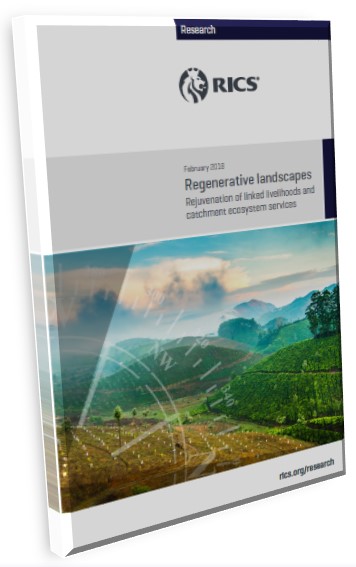 A new RICS Research Trust report authored by Dr Mark Everard on the topic of Regenerative Landscapes: Rejuvenation of linked livelihoods and catchment ecosystem services has just been published. You can find the full publication on the RICS website. The research underpinning the report includes primary research in India and a great deal of secondary research drawing on ‘best practice’ examples from around the world.
A new RICS Research Trust report authored by Dr Mark Everard on the topic of Regenerative Landscapes: Rejuvenation of linked livelihoods and catchment ecosystem services has just been published. You can find the full publication on the RICS website. The research underpinning the report includes primary research in India and a great deal of secondary research drawing on ‘best practice’ examples from around the world.
What is meant by ‘regenerative landscapes’?
Established industrialised world natural resource patterns – lithospheric, agricultural, fishery, forestry, water exploitation and other – have tended to favour rapid and efficient resource extraction and use with no, little or else reactive focus on the renewable limits and regeneration of resources. In particular, resource exploitation for narrow outcomes (food, fibre, mineral and other outputs) has tended to be blind to the wider spectrum of services produced by the ecosystems that provide them, including those underpinning system resilience and distribution of benefit across linked societal beneficiaries (including future generations). As abundantly demonstrated at global scale by the Millennium Ecosystem Assessment and national scale by the UK National Ecosystem Assessment, most major habitat types and their capacities to provide ecosystem services supporting human wellbeing are in sharp decline. This common occurrence of narrowly framed and immediately beneficial technological drivers, reinforced by policy, economic and cultural changes, creating degenerative socio-ecological systems (SESs) is evidenced in microcosm by the author’s work on the Banas catchment of Rajasthan, India.
Ecosystem damage over the last 50 years of the twentieth century was greater than in any comparable period of human history, with estimates that the demands of contemporary global society effectively consume 1.5 ‘Planet Earths’. There is a pressing need to use landscapes and other ecosystems in more sustainable and integrated ways. The Regenerative Landscapes report highlights the need and the means for rebuilding carrying capacity across rural, urban and other cultural landscapes, with a significant emphasis on water.
The research behind the report
There is a pressing need to reverse currently pervasive cycles driving ‘degenerative landscapes’: ecosystems driven into decline, albeit often by laudable intentions such as providing cheap food, by systematically undermining their capacities to support human wellbeing in a linked cycle of degradation. But what does a ‘regenerative landscape’ look like?
There is no simple objective criterion indisputably defining public good or equity. Today’s challenges are not unidimensional but are ‘wicked problems’, difficult or impossible to solve because of incomplete, contradictory and changing requirements, and complex interdependencies. The Regenerative Landscapes report draws upon examples from around the world of land and other natural resource use practices that either protect or rebuild natural capacity, creating virtuous ‘regenerative cycles’. Analysis of the success factors behind these exemplar regenerative cycles informs a review of policy and decision-making processes concerning agricultural and other land uses, the influence of business on natural resource use, and implications for policy areas from transport to defence.
The underpinning research applies the STEEP (social, technological, environmental, economic and political) framework as an interconnected systems model, characterising key features behind the success of regenerative approaches. The report highlights that, as with any system, all aspects of the STEEP framework have to be addressed in an integrated way.
Success factors driving ‘regenerative landscapes’
Drawing on a range of case studies from across the globe, the Regenerative Landscapes report identifies transferrable success factors to accelerate progress towards regenerative ecosystem uses, both in study regions and for more generic application. Examples of some of the key principles of success include:
- Social considerations: take account of implications for all sectors of society, and out-scaling successes using proven social networks.
- Technological considerations: adapt technical solutions to localised geographical and cultural contexts, also taking account of their long-term consequences.
- Environmental considerations: recognise that services provided by ecosystems are a core resource generating multiple benefits, and respect their natural limits.
- Economic considerations: recognise the multi-dimension nature of values (and costs) to all in society, progressively integrate an expanding range of services into markets, and challenge assumptions that multi-service outcomes are not profitable.
- Political considerations: address driving policy or other development priorities as ‘anchor services’, around which outcomes for all ecosystem services and hence net societal value are optimised.
The report’s key conclusion is that regenerative outcomes are possible only when human activities are seen as interdependent with the ecosystems that support them – as elements of socio-ecological systems – and when all facets of the SES inform decision-making and resource use. When choices, for example about technology selection and operation, are made accounting for protection of natural processes and multiple dependent human needs, these tend to promote long-term sustainability, equity and economic viability. Significantly, the ‘softer’ aspects of governance and inclusive decision-making are as important as ‘harder’ technological approaches in meeting human needs on an enduring, equitable and sustainable basis.
